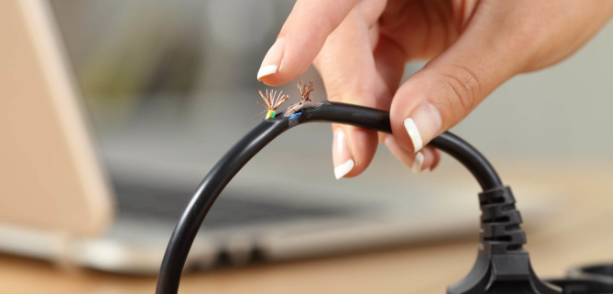Electricity is a fundamental part of our lives, powering everything from the smallest household appliance to the most significant industrial machinery. However, its ubiquity should not lull us into complacency about its potential dangers. This post aims to highlight the risks associated with electricity and provide practical tips for electricians, homeowners, and workers to stay safe.

Understanding the Risks
1. Electric Shock
Electric shocks can vary greatly in their severity, from a minor annoyance to life-threatening injuries. They are often caused by direct contact with exposed wires or faulty electrical equipment. Preventive measures include using insulated tools, wearing rubber-soled shoes, and always turning off the main power source before working on electrical installations.
2. Electrical Fires
Faulty wiring, overloaded circuits, and malfunctioning appliances can all lead to electrical fires. Prevent these potentially devastating incidents by regularly inspecting electrical cords for damage, not overloading outlets, and using appliances as per the manufacturer's instructions.
3. Arc Flash
An arc flash is a type of electrical explosion that can cause severe burns, blindness, and other injuries. Workers should maintain proper distances from live parts, use insulated tools, and ensure that electrical systems are adequately maintained to prevent arc flashes.
4. Electrocution from Power Lines
Working near power lines is incredibly hazardous. Safety tips include maintaining a safe distance, using non-conductive ladders, and assuming that all overhead lines are energized until proven otherwise.
5. Overloaded Circuits
An overloaded circuit can heat up and cause a fire. To avoid this, do not plug too many devices into a single outlet and be mindful of the signs of an overloaded circuit, such as flickering lights or discoloured outlet covers.
6. Damaged Electrical Cords
Frayed, cracked, or otherwise damaged cords pose a significant risk of shock and fire. Regularly inspect cords for damage and repair or replace them as necessary.
7. Water and Electricity
The combination of water and electricity can be deadly. Always keep electrical devices away from water, and never handle electrical appliances with wet hands.
8. DIY Electrical Work
While it may be tempting to tackle electrical projects yourself, amateur electrical work can be extremely dangerous. It's always best to hire a professional electrician for installation and repair work.
9. Lack of GFCI Protection
Ground Fault Circuit Interrupters (GFCI) cut off electrical power in the event of a ground fault, preventing shocks. Ensure that GFCIs are installed in areas prone to wet conditions, such as bathrooms and kitchens.
10. Not Using PPE
Appropriate Personal Protective Equipment (PPE) — including gloves, goggles, and fire-resistant clothing — is vital for anyone working with electricity. Always use the recommended PPE for the job at hand.
Learning from Real-Life Scenarios
Through case studies, we see how ignoring the dangers of electricity can lead to tragic outcomes. For instance, a homeowner's failure to replace a damaged electrical cord resulted in an electrical fire that destroyed their home and caused severe injuries. Similarly, an electrician's lack of proper PPE led to an arc flash that left them with permanent vision loss.
Identifying Common Electrical Hazards
Understanding common electrical hazards is crucial for ensuring safety within any environment. Electrical wiring and extension cords are often used improperly, leading to potential dangers. To avoid electrical hazards, it's essential to ensure that electrical sockets are not overloaded and that all wiring is properly insulated and away from water sources. Hiring a qualified electrician to inspect your home or workplace can help identify risks such as open power distribution units and exposed electrical parts that the human body may accidentally come into contact with. Overhead power lines present a significant risk, especially when using ladders or tall equipment near them. Additionally, defective wiring and unsafe power outlets can lead to serious incidents. Keeping an eye out for these risks and taking preventative measures can significantly reduce the likelihood of electrical accidents.
Staying Safe with Electricity: Practical Tips and Best Practices
Ensuring the safe use of electricity is not just about avoiding hazards; it's about fostering a culture of safety and awareness, whether at home or in the workplace. Here are some practical tips and best practices to help mitigate the risks associated with electricity:
-
Regular Maintenance and Inspections: One of the most effective ways to prevent electrical accidents is to ensure that all electrical systems and appliances are regularly inspected and maintained. This includes looking for any signs of wear and tear, checking for loose wires, and ensuring that all components are functioning correctly.
-
Educating Yourself and Others: Understanding the basics of how electricity works and the common risks associated with its use can significantly reduce the likelihood of accidents. Homeowners, workers, and especially children should be educated on the dos and don'ts of electrical safety.
-
Investing in Quality Electrical Components: Opting for cheaper, lower-quality electrical components can be a false economy. High-quality, certified electrical materials and devices are less likely to malfunction and pose a risk to users.
-
Developing and Following Safety Protocols: Whether it’s a protocol for locking out and tagging out circuits before repair work or rules about keeping liquids away from electrical devices, having clear, written safety protocols can significantly reduce the risk of electrical accidents.
-
Emergency Preparedness: Knowing what to do in case of an electrical accident can save lives. This includes knowing how to turn off the main power supply, using a fire extinguisher suitable for electrical fires, and having a clear plan for evacuating the area if necessary.
By proactively addressing the dangers associated with electricity and implementing these practical tips, individuals and organisations can significantly reduce the risks and ensure a safer environment for everyone involved.
Conclusion
Electricity is not something to be taken lightly. By understanding the risks and taking appropriate precautions, we can minimise the dangers and create safer environments for ourselves and others. Whether you're an electrician, homeowner, or worker, always prioritise safety when it comes to electricity. Remember: it's better to be safe than sorry. So, follow the guidelines mentioned above closely and stay safe!
